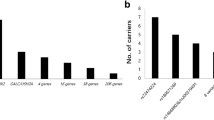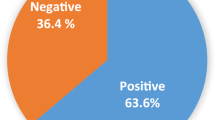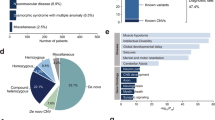Abstract
Carrier screening is important to people have a higher prevalence of severe recessive or X-linked genetic conditions. This study is aimed that the frequency and uncertain nature of genetic variants was identified in Taiwanese population, providing individuals with information at risk of inherited diseases and their heritability to newborns. A total of 480 subjects receiving genetic counseling with no family history of inherited disorders were recruited into a cohort from 2018 to 2022. Next-generation sequencing (NGS) panel for autosomal dominant (AD), autosomal recessive (AR) and X-linked diseases was sequenced to assess disease prevalence and carrier frequency for the targeted diseases. Publicly available NGS datasets were analyzed following a tier-based system and ACMG recommendation. 5.3% of subjects showed the presence of variants for genetic disorder, and 2.3% of them were determined with AD. 14 of subjects with pathogenic variants were carriers for AR. The inherited genes were LDLR for AD disorders and AR disorders included GAA and ATP7B. 21.6% of subjects had highest carrier frequency of GJB2 gene. 0.5% of subjects had highest frequency of GJB6 for AR condition. In conclusions, the variants in LDLR, GAA and ATP7B genes were identified in Taiwanese population, indicating individuals had higher risk of Pompe disease, Wilson’s disease and familial hypercholesterolemia. Taiwanese individuals carrying GJB2 and GJB6 had the considerable risk of hearing loss passing to their offspring.
This is a preview of subscription content, access via your institution
Access options
Subscribe to this journal
Receive 12 print issues and online access
$259.00 per year
only $21.58 per issue
Buy this article
- Purchase on Springer Link
- Instant access to full article PDF
Prices may be subject to local taxes which are calculated during checkout
Similar content being viewed by others
Data availability
Data analyzed during this study are included in this published article.
References
Hallam S, Nelson H, Greger V, Perreault-Micale C, Davie J, Faulkner N, et al. Validation for clinical use of, and initial clinical experience with, a novel approach to population-based carrier screening using high-throughput, next-generation DNA sequencing. J Mol Diagn. 2014;16:180–9.
Gregg AR, Aarabi M, Klugman S, Leach NT, Bashford MT, Goldwaser T, et al. Screening for autosomal recessive and X-linked conditions during pregnancy and preconception: a practice resource of the American College of Medical Genetics and Genomics (ACMG). Genet Med. 2021;23:1793–806.
Richards S, Aziz N, Bale S, Bick D, Das S, Gastier-Foster J, et al. Standards and guidelines for the interpretation of sequence variants: a joint consensus recommendation of the American College of Medical Genetics and Genomics and the Association for Molecular Pathology. Genet Med. 2015;17:405–24.
Miller DT, Lee K, Abul-Husn NS, Amendola LM, Brothers K, Chung WK, et al. ACMG SF v3.1 list for reporting of secondary findings in clinical exome and genome sequencing: A policy statement of the American College of Medical Genetics and Genomics (ACMG). Genet Med. 2022;24:1407–14.
Committee Opinion No. 691: Carrier Screening for Genetic Conditions. Obstet Gynecol. 2017;129:e41–e55.
Kishnani PS, Steiner RD, Bali D, Berger K, Byrne BJ, Case LE, et al. Pompe disease diagnosis and management guideline. Genet Med. 2006;8:267–88.
Turaça LT, de Faria DO, Kyosen SO, Teixeira VD, Motta FL, Pessoa JG, et al. Novel GAA mutations in patients with Pompe disease. Gene. 2015;561:124–31.
Aung-Htut MT, Ham KA, Tchan MC, Fletcher S, Wilton SD. Novel mutations found in individuals with adult-onset Pompe disease. Genes (Basel). 2020;11:135.
Joo YS, Kim HW, Lee S, Nam KH, Yun HR, Jhee JH, et al. Dietary zinc intake and incident chronic kidney disease. Clin Nutr. 2021;40:1039–45.
Kuo CW, Hwu WL, Chien YH, Hsu C, Hung MZ, Lin IL, et al. Frequency and spectrum of actionable pathogenic secondary findings in Taiwanese exomes. Mol Genet Genom Med. 2020;8:e1455.
Kamar A, Khalil A, Nemer G. The digenic causality in familial hypercholesterolemia: revising the genotype-phenotype correlations of the disease. Front Genet. 2020;11:572045.
Snoeckx RL, Huygen PL, Feldmann D, Marlin S, Denoyelle F, Waligora J, et al. GJB2 mutations and degree of hearing loss: a multicenter study. Am J Hum Genet. 2005;77:945–57.
Kiseleva AV, Klimushina MV, Sotnikova EA, Divashuk MG, Ershova AI, Skirko OP, et al. A data-driven approach to carrier screening for common recessive diseases. J Pers Med. 2020;10:140.
Luo H, Yang Y, Wang X, Xu F, Huang C, Liu D, et al. Concurrent newborn hearing and genetic screening of common hearing loss variants with bloodspot-based targeted next generation sequencing in Jiangxi province. Front Pediatr. 2022;10:1020519.
Van Heurck R, Carminho-Rodrigues MT, Ranza E, Stafuzza C, Quteineh L, Gehrig C, et al. Benefits of exome sequencing in children with suspected isolated hearing loss. Genes (Basel). 2021;12:1277.
Kuo CN, Liao YM, Kuo LN, Tsai HJ, Chang WC, Yen Y. Cancers in Taiwan: practical insight from epidemiology, treatments, biomarkers, and cost. J Formos Med Assoc. 2020;119:1731–41.
Lewandowska A, Rudzki G, Lewandowski T, Stryjkowska-Góra A, Rudzki S. Risk factors for the diagnosis of colorectal cancer. Cancer Control. 2022;29:10732748211056692.
Yu J, Feng Q, Kim JH, Zhu Y. Combined effect of healthy lifestyle factors and risks of colorectal adenoma, colorectal cancer, and colorectal cancer mortality: systematic review and meta-analysis. Front Oncol. 2022;12:827019.
Author information
Authors and Affiliations
Corresponding author
Ethics declarations
Competing interests
The authors declare no competing interests.
Ethics approval
The designation of the study followed the Declaration of Helsinki, and the studying protocol was reviewed and approved by Department of Obstetrics and Gynecology, Shin Kong Wu Ho-Su Memorial Hospital (IRB number: 20230403 R). A signed informed consent was obtained from all participants.
Additional information
Publisher’s note Springer Nature remains neutral with regard to jurisdictional claims in published maps and institutional affiliations.
Supplementary information
Rights and permissions
Springer Nature or its licensor (e.g. a society or other partner) holds exclusive rights to this article under a publishing agreement with the author(s) or other rightsholder(s); author self-archiving of the accepted manuscript version of this article is solely governed by the terms of such publishing agreement and applicable law.
About this article
Cite this article
Chen, L.S., Yu, C.W., Li, W.J. et al. Carrier screening for present disease prevalence and recessive genetic disorder in Taiwanese population. J Hum Genet 69, 115–118 (2024). https://doi.org/10.1038/s10038-023-01212-7
Received:
Revised:
Accepted:
Published:
Issue Date:
DOI: https://doi.org/10.1038/s10038-023-01212-7



